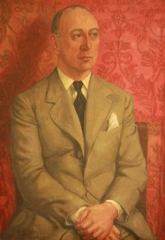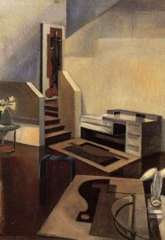Later in life, Bacon was very dismissive of his early designs, saying they were derivative of French modernists. Nevertheless, the geometry of some of his furniture foreshadows certain significant elements of his paintings. His experience with interior spaces and his predilection for mirrors, tubular steel furniture, curtains and tassels later filter into the iconography of his paintings. Bacon’s furniture and mirror designs are mainly influenced by the work of Eileen Gray, Charlotte Perriand or Le Corbusier. In August 1930, he is singled out in an article in The Studio magazine entitled ‘The 1930 Look in British Decoration’, for his impressively avant-garde furniture designs.
In November 1930, he holds an exhibition of his furniture, rug designs and paintings at 17 Queensberry Mews West, London, together with paintings by Roy de Maistre and Jean Shepeard. In 1933, Bacon lessens his involvement with interior design, to concentrate on being a painter. In about 1932, Bacon meets Eric Hall, who would later become his lover and patron until the end of the 1940s.




